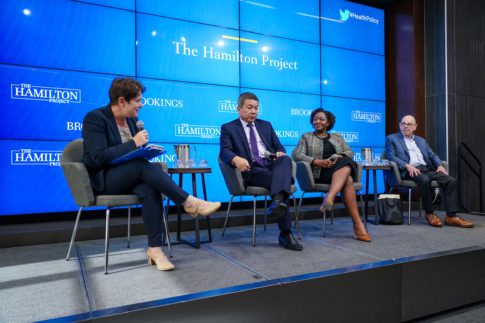On Thursday October 26, 2023, The Hamilton Project (THP) at The Brookings Institution hosted an event to discuss health care policy reform in the United States. The event coincided with the release of two policy proposals from THP.
The opening discussion featured author Amy Finkelstein of the Massachusetts Institute of Technology and moderator Jason Furman of Harvard University. The first discussion focused on Finkelstein and Liran Einav’s (Stanford University) proposal for universal basic health care, “Designing US health insurance from scratch: A proposal for universal basic coverage.” In this publication, they propose universal basic coverage with optional supplemental packages as a solution to the fragmented state of the current health care system.
During the discussion, Furman asked Finkelstein to elaborate on the specifics of how this policy would work and why they chose to write about this topic. Finkelstein responded that they chose this project in part because of the large number of Americans who will temporarily lose coverage over a two year period, a number demonstrative of the large coverage gaps in our system.
The conversation continued by exploring the feasibility of the proposal, specifically what budgeting for the policy would look like and what potential challenges providers may face. They also discussed the many benefits that would arise from this reform, including the benefits of being ready for reform when a door opens.
The discussion was followed by a panel that included Esther Krofah of the Milken Institute, Kyu Rhee of the National Association of Community Health Centers (NACHC), Henry Waxman of Waxman Strategies, and moderator Wendy Edelberg of The Hamilton Project. During the second panel, Edelberg and panelists discussed the importance of community health centers in our current health care model, how the U.S. arrived at this fragmented state of health care, and what challenges may lie ahead when looking to implement reform.
Throughout the panel, Rhee discussed how community health centers play a role in the current structure of the U.S. health care system. Community health centers serve 31.5 million. Of those who utilize community health centers, 90 percent are below 200 percent of the Federal Poverty Level, 64 percent are minorities, and 41 percent are from rural communities. In short, these centers provide care to populations where traditional health care tends to have gaps. Rhee also discussed the importance of the type of services provided by community health centers, and when discussing future reforms, he emphasized funding primary care in the U.S. and the importance of investment in preventative care.
Krofah followed up by discussing the downstream consequences of fragmented access to coverage. Particularly, on medical research in the U.S., she stated, “Because of the way that our health care system is structured, that same fragmentation that happens upstream in coverage goes downstream into the ecosystems that answer these questions.” Krofah emphasized that disproportionate representation in who is studied for medical research creates a variety of ripple effects in equitable treatment, including a fragmented understanding of appropriate care for different populations of people.
Waxman wrapped up the event by discussing the potential for implementation of Finkelstein and Einav’s proposed reform given the political landscape. Waxman concluded on a hopeful note, reminding the audience of the great strides that have already been made in health care, specifically the immense increase in coverage as a result of the Affordable Care Act. Although he expressed that sweeping reform in Congress is difficult, he shared that this policy proposal provides a north star for health care reform that prepares policymakers and experts for the moments when reforms can be passed. He ended by urging the policymakers and health care experts to “take advantage of any positive move we can make.”
This is an event summary of “We’ve got you covered: Meeting basic health care needs“




